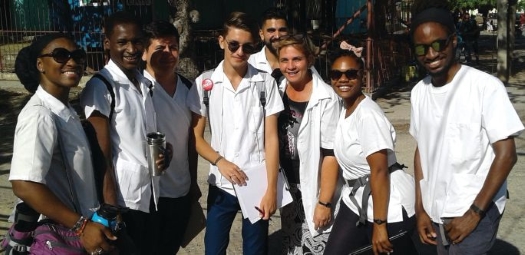
What's your opinion on this article?

Some students in medical program in Cuba. Photos courtesy of Ishan N Muhammad
|
Starting March 18, all classes for medical students in their third to fifth years of study here in Cuba were suspended for organizing pesquisa (door-to-door home investigations) for possible coronavirus cases and to share best practices information and general information about protecting oneself from the possibility of contracting the Covid-19 virus.
Pesquisa started March 19, 2020. While to some this may seem crazy, Cuba has been very effective using this method in the past for other illnesses such as dengue fever, which ails Cuban communities annually and is carried by mosquitos. Prevention methods are key in this bio-psycho-social structured medical program.
Once the Cuban Ministry of Public Health (Ministerio de Salud Publica) is aware of a health-related problem, all precautions are taken to try to ensure the maintenance of best health and to treat the sick in the timeliest fashion possible.
The other thing that is very instrumental in Cuba is the solidarity that exists among the Cuban people and others who live in Cuban communities regardless of where they may be from. This includes students like me from the capital of the United States of America, Washington, D.C. This solidarity is what helps to maintain the genuine love, care and respect for one another, especially during such trying times as a possible health epidemic in the country.
In this sense, the work not only lies in the hands of medical workers, such as doctors and nurses, but also across all existing organizations in Cuba to help disseminate educational materials via every type of communication available to prevent illness.
During the television program Mesa Redonda one evening, the head of Central Investigation, Diagnostic and Reference of the Institute of Tropical Medicine, Dr. Maria Guadalupe Guzman Tirado, noted that although coronavirus was detected in the decade of 1930 affecting many animals and again in the 1960s affecting humans, the current strand Covid-19 surfaced towards the end of 2019. It is new, arose in Wuhan, China, and is already noted to have similarities with SARS, another deadly respiratory disease that was isolated in bats, who are carriers of many different viruses.
The specialists at the institute believe it is possible that there is an unknown intermediate host, but it is very probable that Covid -19’s origin is from bats.
The doctor also briefly explained how the type of virus that coronavirus is explains why handwashing frequently with soap and water or alcohol (i.e. hand sanitizer) are part of personal precautions. The virus can enter the body through the mouth, eyes or nose and then produce a respiratory infection.
According to specialists, the diagnosis of the virus is found by testing the exudate (liquid excretions due to inflammation) from the nasopharyngeal (found at the back of the nose and connects the nose to the top of the mouth). This PCR test cost anywhere between $40 to $50 here in Cuba, therefore it is very costly, but was available in three central Cuban provinces.
As of this writing, Cuba had confirmed seven cases of coronavirus in people who were visitors to its island and not from Cuba. The director of the Unity of Promotion of Health and Prevention of Illness, Pablo Feal Cañizares, said the main work that we have right now is to identify the most vulnerable groups that can be affected by the virus. This includes people who are 60 years of age or older and people who already have respiratory illnesses or other immune system ailments. Children whose immune systems are still developing to maturity are also more vulnerable and have more trouble dealing with respiratory illnesses.
Thus, upon starting the pesquisa, we will be looking for respiratory symptoms with the objective of taking immediate action to address those symptoms. It has also been advised not to travel outside of the country. If one does travel, one must report to the sanitary checking departments for continual checks and observance of health status upon return to Cuba.
As we, medical students, embark today and on our days to come, we stand in solidarity with the Cuban people and all its actions to offer the best services from a medical standpoint to make the world a better place.
Allah (God) is the Best Planner and Knower, and with that said, I am faithful that we are prepared to confront the challenges that are to come as we face a possible epidemic of this new strand of coronavirus.
I believe I have been trained well by the Cuban medical program up until now that has been afforded to me by the triumphant Comandante Fidel Castro. With his insight, along with the collaboration of the Honorable Minister Louis Farrakhan and the late, triumphant Reverend Lucius Walker to send students from North America here to study medicine, we are building a better future by becoming Revolutionary Doctors not only prepared to combat the ailments of today and tomorrow, but who are also prepared to lead the way in doing so!
Ihsan Nimat Muhammad is a fourth-year medical student at ELAM, the Latin American School of Medicine in Cuba. She is an MD candidate for 2022, CCMA, CPT, and trained Spanish interpreter. She is from Washington, D.C., and was born and raised as a member of the Nation of Islam. She is a proud member of Zeta Phi Beta Sorority, Inc., the Student National Medical Association (SNMA Cuba chapter) and its Community Service Chairperson. Ihsan is also a Certified Emergency Response Team (CERT) member in Washington, D.C.